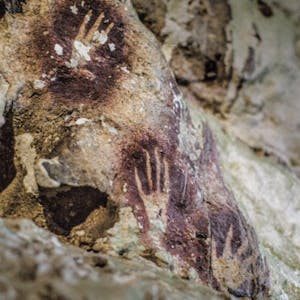Richard Schechner’s Introduction to Performance Studies
Performance Studies: An Introduction explores the wide world of performance–from theatre, dance, and music to ritual, play, political campaigns, social media, and the performances of everyday life. Performance studies also ranges across cultures–Asia, Africa, the Caribbean, Europe, the Americas. And it spans historical periods from the art of the paleolithic caves to YouTube and the avantgarde. This course is devised by …
Richard Schechner’s Introduction to Performance Studies
Performance Studies: An Introduction explores the wide world of performance–from theatre, dance, and music to ritual, play, political campaigns, social media, and the performances of everyday life. Performance studies also ranges across cultures–Asia, Africa, the Caribbean, Europe, the Americas. And it spans historical periods from the art of the paleolithic caves to YouTube and the avantgarde. This course is devised by Richard Schechner, one of the pioneers of performance studies, in dialogue with more than a dozen expert scholars and artists. Performance Studies: An Introduction puts students in dialogue with the most important ideas, approaches, theories, and questions of this dynamic, new academic field.Learning Objectives
By the end of this course, you should be able to:
Articulate and analyze the major concepts of performance studies Identify and analyze performances within the “broad spectrum of performance”–from everyday life and social media to performance art and global spectacles such as the Olympics Comprehend key terms of performance studies, including is/as performance, restored behavior, ritual, play, make-belief/make-believe, performance in everyday life, the performative, and intercultural performance Produce collaborative work that demonstrates teamwork in applying ideas learned in the course Compare, analyze, and interpret performances of their own and other cultures Articulate how the major concepts of the course relate to their own experiences and worldviews Analyze and criticize in a constructive way the work of classmates
The lessons present Schechner’s concept of performance studies along with online assignments. In the assignments, students apply what they are learning by composing short responses to materials, writing in their NYU Classes Forums, and by reviewing other students’ forum posts each week.
Students choose either to work in groups of 3 to 5 on a term-long project maintaining a project portfolio in NYU Classes or to write a research paper. During the term, each group will lead an in-class 25-minute discussion of their project-in-progress. During the last face-to-face class, each group will present their project.
The weekly content is:
What is Performance? What is Performance Studies? Performance Processes From Not Performing to Performing Ritual Play Performing in the Paleolithic Ramlila of Ramnagar The Performing Brain Performativity Constructing Social Roles Social Media Intercultural, Transcultural, Global Group Projects & Wrap Up Course Requirements
Each student is required to complete the week’s online lesson prior to the class session, attend and participate in the class sessions, complete the weekly assignments, participate and present the group project or submit a final paper.
Required Readings
See weekly online lessons.
Required Viewings (Videos)
See weekly online lessons.
Written work
Each student will either participate in a group project or write a research paper due at the end of the term, submitted electronically. Your professor will confer online and/or face-to-face during office hours to help students develop their writing and their projects. If you do a group project your professor may ask you to do some writing in relationship to your project.
Academic Integrity
The policy on plagiarism and academic honesty is posted on Classes. Read this document carefully, and be guided by it.
Copyright
Keep in mind the material you find in the online lessons is subject to copyright. You may not reproduce, reuse, or distribute it without permission outside of your work in this course. For more information on copyright and how it applies to course materials, see the Copyright Basics research guide.
None
Syllabus
Syllabus - What you will learn from this course
Week 1
Introducing the Course
Week 2
What Is Performance? What Is Performance Studies?
Week 3
Performance Processes
Week 4
From Not-Performing to Performing
Week 5
Ritual
Week 6
Play
Week 7
Performing in the Paleolithic
Week 8
Ramlila of Ramnagar, India
Week 9
Performativity
Week 10
Constructing Social Roles
Week 11
Social Media
Week 12
Intercultural, Transcultural, Global
Week 13
Looking Back, Looking Forward
FAQ
When will I have access to the lectures and assignments?
Access to lectures and assignments depends on your type of enrollment. If you take a course in audit mode, you will be able to see most course materials for free. To access graded assignments and to earn a Certificate, you will need to purchase the Certificate experience, during or after your audit. If you don't see the audit option:
What will I get if I purchase the Certificate?
When you purchase a Certificate you get access to all course materials, including graded assignments. Upon completing the course, your electronic Certificate will be added to your Accomplishments page - from there, you can print your Certificate or add it to your LinkedIn profile. If you only want to read and view the course content, you can audit the course for free.
Is financial aid available?
Yes. In select learning programs, you can apply for financial aid or a scholarship if you can’t afford the enrollment fee. If fin aid or scholarship is available for your learning program selection, you’ll find a link to apply on the description page.
Reviews
Excellent introduction to Performance Studies from the expert who wrote the definitive text on the subject.
It was fun, but felt like an exam. But I like this guy. Nice job.
Start your Free Trial
Self paced
5,068 already enrolled
4.7stars Rating out of 5 (46 ratings in Coursera)
Go to the Course
